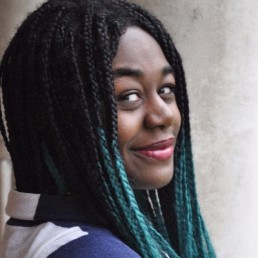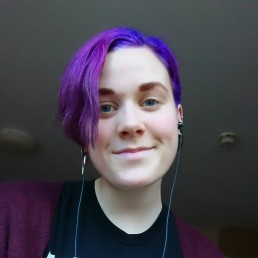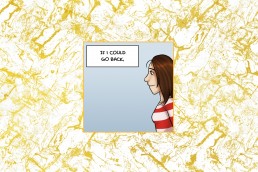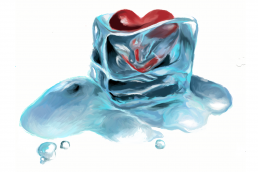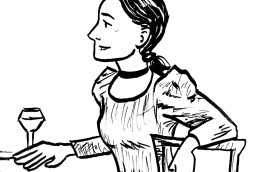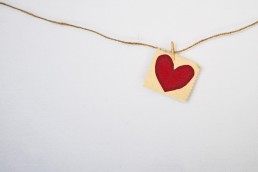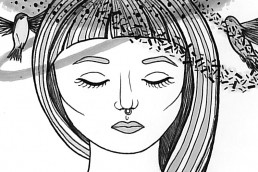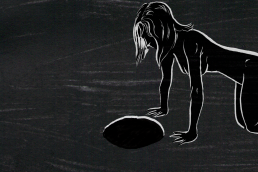by Nicole Acquah
Image credit: PeacefulPirateNinja
Content Warning: eating disorders
If someone had approached me a few years ago and told me I would speak openly about eating disorders by the time I was 22 years old, I would’ve laughed in their face. Who knows what I would have done had they said I would be thankful for having the disorder? For their sake, it’s probably best that no one did.
I once believed that recovery wasn’t for me because I was a special type of messed up. Even if I recovered by some sort of miracle, I was sure I’d never be able to talk about it. I was so used to living in secrecy. I think anyone with an eating disorder (ED) can relate — I lied frequently to myself, my family and my friends until I began to believe those lies too.
But today I can honestly say that I’m grateful for the years I lived with an eating disorder. I love life so fully that I see my past as nothing but a stepping stone to my current life.
If you’re struggling with addiction, the idea of thankfulness for your current situation might seem ludicrous. But I promise that it’s possible to move past the self-loathing, hurt and resentment. It’s very possible to one day look back on this part of your life and smile. I believe true freedom comes with a sense of gratitude and I have a lot to be grateful for. Here is a brief (although not comprehensive) list of why I’m thankful:
1. I’m a more empathic person.
Before the eating disorder, I just didn’t understand mental illnesses. And because I didn’t understand them, I didn’t have empathy for people who were struggling. Experiencing mental health issues gave me a reality check. I’m not saying I’m happy I abused my body. I’m not glad I missed so many university classes. I’m not proud I pushed away friends and I’m not fist-pumping for every single heart palpitation that terrified me. What I am saying, though, is that I’m glad I went through it because I learned how to love others, how to be open to others and, importantly, how to listen to other people.
2. I know that nothing is impossible.
This is the biggest and most important thing I have learnt and continue to be grateful for. Faith might not be for everyone but as a Christian, whenever I face adversity, whenever I feel low or wonder if I can survive a particular challenge, I remember a passage from the book of Luke, ‘with God, nothing will be impossible’. A few years ago, I was simply a believer of this verse. Now I have seen this philosophy in action. When life feels unbearable, I am reminded that my faith already got me through the hardest, most miserable years of my life. That gives me peace and deep-rooted hope. I am able to consider it a blessing to have been miserable at such a young age, because now I can go through the rest of life knowing that I am strong enough to do anything with perseverance, strength of character and hope (Romans 5:3-5).
3. Mealtimes are a blessing.
Yes. I said it. Mealtimes are awesome. If you’re going through an ED right now, this might be one of the strangest points I’ve made yet. Before eating, I try to take a moment to say grace and enjoy the fact that I am blessed enough to have food. Please do not confuse this with guilt-tripping comments people make such as: “How can you have an eating disorder when others are starving?! Be more grateful!” We all know such statements aren’t beneficial for those with anorexia, orthorexia, bulimia, or any other illness. To approach mealtimes with true peace and thankfulness is a very healthy place to be in and sometimes it takes time to arrive at that place. I encourage you to stay on your journey because that place is waiting for you. I’m no longer filled with fear when I see food, but joy and thanksgiving. These feelings come from knowing how I felt before. It’s not just a thankfulness for food but a thankfulness for the fact that I can even be thankful for food in the first place. It’s okay if you’re not thankful for mealtimes today but one day you will be and I promise, your heart will soar.
4. My tolerance for self-bashing is low.
When my friends grumble, “My thighs are huge” or “I look disgusting” I no longer add to the chorus. Instead I shift the conversation to something positive. Perhaps it’s because I spent so long hating myself, but the thought of wasting more of my precious life by making disparaging comments is laughable. As a wise woman said — ain’t nobody got time for that!
I know that staying silent while your friends partake in ‘harmless’ moments of body shaming and comparison can feel awkward. Especially when putting yourself down is your friendship group’s pastime. But everyone is on their own journey and you should never feel obliged to improve someone’s self-esteem by lowering your own — i.e. “Your thighs are big? Look at mine!” If your friends love you, they shouldn’t want you to put yourself down. It’s okay — nay, fantastic — to encourage others without diminishing yourself.
5. I can inspire others.
I don’t use the word ‘inspire’ lightly; I truly believe my journey has helped people. I remember looking at someone I love and realising I never wanted him to experience what I had been through. In that moment I thought, ‘If this is why I had an eating disorder, then I’m thankful.’ When I was in recovery, I focused on myself. Now I’m recovered, I focus on helping others, which is easier because I’m no longer clueless when it comes to offering practical advice. Moreover, if sharing my story, if simply being, helps another soul on their journey to reclaiming their life, then every moment was worth it. My pain had purpose.
Yours can too.
Nicole Acquah
Nicole Acquah is a writer, performer and theatre director. She has recently finished an MA in Advanced Theatre Practice at the Royal Central School of Speech and Drama. Nicole has a particular interest in new writing, physical theatre and autobiographical performance. She is passionate about raising awareness of issues such as racism, sexism and mental health in her work. She secretly wishes she could rap or beatbox but she can’t (yet) so she performs spoken word at venues across the UK. Close enough. Her undergraduate in Drama and Creative Writing at Royal Holloway has given her experience in writing fiction, playwriting and screenwriting. Nicole loves collaborating and is always up for hearing from other artists.
PeacefulPirateNinja
Remi Jokiranta, aka PeacefulPirateNinja, is a 20-year-old psychology student from Finland currently studying in Edinburgh. They are very passionate about human rights (especially women’s and LGBTQIA+ rights) and animal rights and they advocate for these causes in many different ways (street activism, social media, art, etc.). They love to draw, paint and write poems. They’re also very passionate about self-love, addressing mental health issues and being inclusive to everyone.

